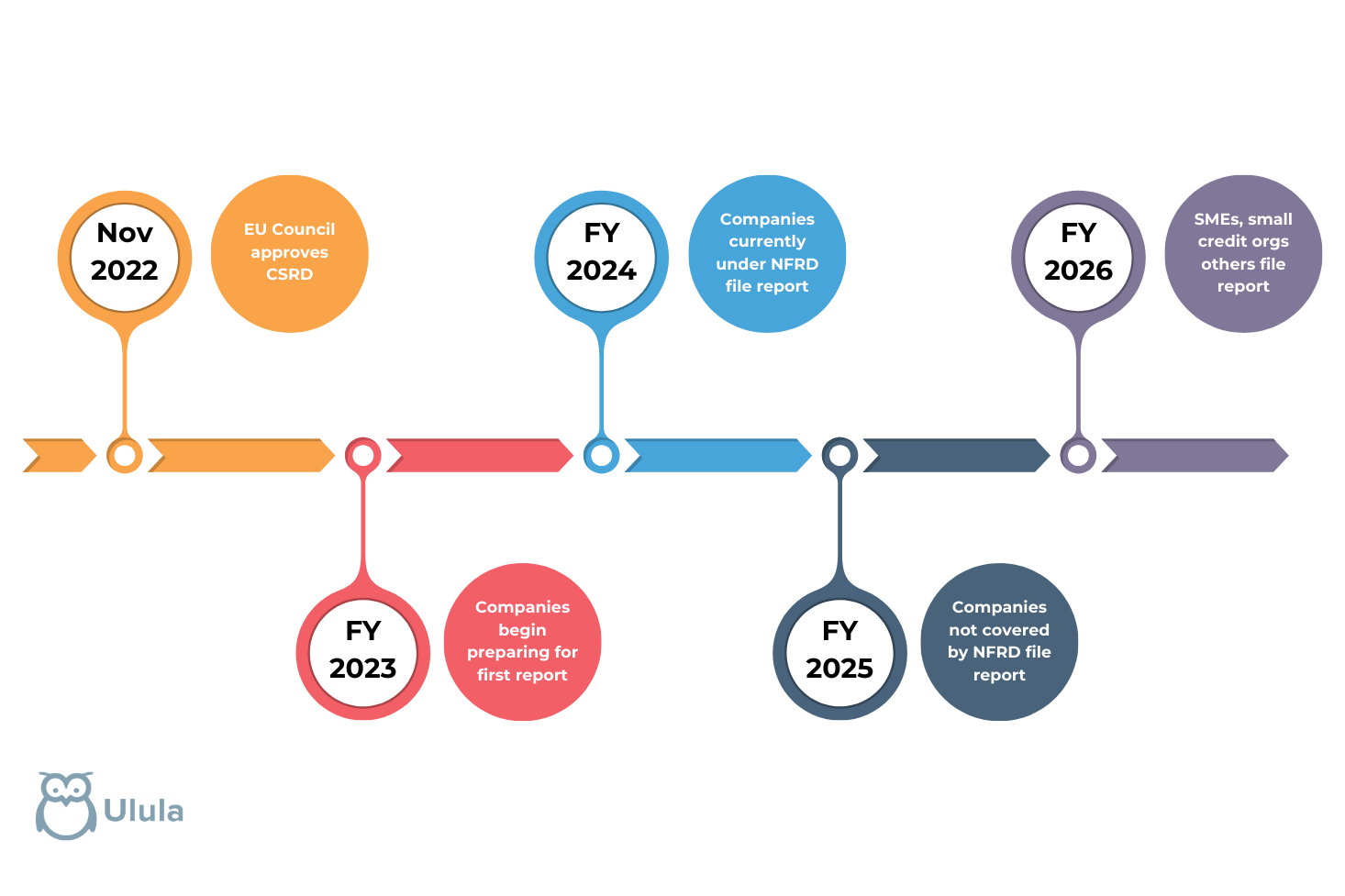The Corporate Sustainability Reporting Directive (CSRD) is coming, and it’s going to shake things up for EU companies. But too many companies are unprepared for their CSRD journey. If you’re among them, don’t panic. There’s still time to prepare for CSRD compliance.
In this blog, we’ll delve into what the CSRD is and what it means for your business. We’ll explore how you can gather data for your CSRD reporting using worker-first worker engagement tools designed for the digital era. We will cover all you need to know about CSRD compliance, whether you’re already preparing, or taking your first step.
The CSRD is Coming, Many Companies aren’t Ready
The implementation of the CSRD is imminent, with the European Commission stating that many large EU businesses are required to file their first corporate reports by 2025 for the 2024 financial year. It’s clear that for the EU, sustainability matters. The CSRD is a flagship regulation of the EU Green Deal, but it isn’t just about climate change, it covers social and labor issues too. Under the CSRD reporting requirements, companies need to report on their social impact policies and projects, and also outline how they are identifying, assessing and mitigating social and labor risks in the supply chain that are material to them, i.e. that result from and affect their business activities.

CSRD reporting is on the horizon. Is your business ready?
Still, numerous companies are still unprepared for CSRD compliance. Certain sectors, such as the automobile industry, are lagging far behind others when it comes to ESG reporting, or gathering the data needed to meet the appropriate disclosure requirements or for a materiality assessment. It may be the first time that some companies are getting to grips with non-financial reporting of this kind, but companies don’t have much time left to prepare for a newly regulated market
The CSRD, Social Impact and Human Rights Due Diligence: What’s New?
The EU CSRD is a market shaping regulation with impacts at the global level for sustainable finance disclosure regulation. The Directive, proposed by the European Parliament and European Commission, was approved by the EU Council on 22 November, has entered the Official Journal of the European Union, and will be enforced by EU member states. The new rules mean not only large companies in the EU, but also EU subsidiaries of non-EU businesses that work in Europe, need to disclose their environmental, social, and governance (ESG) performance on their annual regular reports for the fiscal year. For the vast majority of large businesses in the EU, compliance with the Directive will be mandatory.

EU Parliament (Credits: Politico)
The CSRD expands the scope of end of year reporting to include material social and environmental impacts in addition to financial ones. The aim is to create a standardized set of data to improve transparency for consumers and investors across non-financial indicators, from greenhouse gas emissions to forced labor risks, child labor, and more. Failure to comply can lead to a public statement being made about a breach, an order to change conduct, and financial penalties. Member states can choose the size of these fines, but they can be significant (Germany currently fines up to 10m EUR or 5% of annual turnover.) Furthermore, it will be mandatory for reports under the CSRD to be independently audited.
What are the European Sustainability Reporting Standards?
The European Sustainability Reporting Standards (ESRS) provide guidelines for harmonizing sustainability and social impact data across the EU. The ESRS cover financial, environmental, social, and governance aspects while promoting double materiality in sustainability reporting, i.e. the expansion of materiality to non-financial matters as outlined in the CSRD.
When the CSRD talks about standards, it’s referring to the standards outlined in the ESRS. Reporting against these standards is essential for CSRD reporting compliance. There are a significant amount of potential data points that companies will need to report on under the CSRD, but first companies will need to clarify and assess what aspects are mandatory, and what aspects are relevant and material to them under the concept of double materiality. Ulula can help companies consult with vulnerable and hard to reach stakeholders to paint a clear picture of what non-financial impacts are material for companies.
What Parts of the ESRS Relate to the Supply Chain Social Impact CSRD Requirements?
The ESRS includes requirements to disclose social compliance, human rights, and social activities.
Companies are required to disclose the impact of their business activities on sustainability issues, including social aspects. This includes policies on human rights and workers’ rights, their impact, measurement of progress, and so on. Reporting should cover workers in the value chain and affected communities according to ESRS.
ESRS Reporting Requirements: Workers in the Value Chain
Companies that are subject to the CSRD must comply with the requirements related to workers in the value chain. This includes:
Disclosures around how a businesses undertaking affects the material impacts on value chain workers, whether those impacts are positive or negative, actual or potential. Actions taken to prevent, mitigate or remediate those risks. The extent of those material risks, and their potential financial impact on the undertaking itself.
What are those risks to workers in the value chain? Those risks include potential impacts on working conditions, secure employment, working time, wage payments, freedom of association, collective bargaining, work-life balance, gender equality and equal treatment, discrimination, harassment, forced labor, child labor, water and sanitation, privacy, and so on. According to the ESRS draft data point requirements under ESRS-S2 for this group, there are 75 potential data points that companies will need to collect.
Companies must also outline how such impacts affect the financial and material state of the businesses undertaking itself. For example, negative impacts on value chain workers could lead to consumer boycotts.
ESRS Reporting Requirements: Affected Communities
In short, under the ESRS, companies are required to report on social impacts on affected communities. This covers:
Impacts on affected communities in areas where risks are likely to be prevalent that result from business activities, upstream and downstream in the supply chain. Actions taken to prevent, mitigate or remediate those risks. The extent of those material risks.
What are those risks? They include potential impacts on issues like economic, social and cultural rights, housing, food supply, water, and sanitation, land rights, civil and political rights such as freedom of assembly with a particular focus on the rights of indigenous communities. According to the ESRS draft data point requirements under ESRS-S3 for this group, there are 74 potential data points that companies will need to collect.
Companies must also outline how such impacts affect the financial and material state of the businesses undertaking itself. For example, negative press over community issues could harm a company’s reputation, affecting its share price.
Getting the right HRDD Data for your CSRD Reporting Won’t Happen Overnight
CSRD reporting requires the collection and analysis of granular data, and its impact on business operations will be significant. Addressing human rights due diligence (HRDD) issues like forced labor, trafficking, child labor, and payment discrepancies in the global supply chain are vital, as they pose material risks to companies’ reputation, share price, and legal standing, with fines for non-compliance linked to net turnover.
In order to meet the social requirements of the CSRD, as spelled out in the European Financial Reporting Advisory Group’s (EFRAG), European Sustainability Reporting Draft Standards (ESRS), companies need to start gathering data about the social and labor impacts of their activities in the supply chain. These data points have recently been published by the EFRAG, with detailed data point requirements for workers in the value chain and affected communities.
Complex reporting requirements such as the following;
“disclosure of whether and how the undertaking has developed an understanding of how affected communities with particular characteristics or those living in particular contexts, or those undertaking particular activities may be at greater risk of harm” (ESRS-S3, SBM-3, 10)
can feel significantly broad, and potentially place a heavy resource burden on companies involved.

Digital worker and community engagement tools are making comprehensive end-to-end supply chain social compliance viable for businesses
That’s why a new generation of digital worker and community engagement tools are making comprehensive end-to-end supply chain social compliance viable for businesses that need to report under the CSRD.
Obtaining accurate and reliable data on such issues means establishing data points and implementing processes to report those metrics from upstream workers and communities right up to the board room. Consultancies can provide support, but they have limitations. They may help companies with carrying out high-level strategy reviews and recommendations, but without the tools and expertise to get granular data, a number of companies could fall short. Most businesses are yet to implement supply chain global risk-management systems and supplier level risk assessments. Most companies have no way of knowing what day to day life is like for the workers that work in the factories and plantations in their supply chains, or the communities around them.
Make your CSRD Reporting Fit for the Digital Era
Meeting the sustainable activities requirements of the CSRD will be easier with the adoption of digital engagement tools and technologies. Failure to do so means companies will be stuck either trying to scale up costly in-person audits, or using older methods like hotlines or suggestion boxes that have proven to be ineffective. The only way for companies to get the kind of granular data they need to report on the risks listed above is to engage with workers and communities.
 Ulula’s supply chain social impact risk assessment and measurement tools provide a good starting point for companies, with their ability to conduct surveys among workers across multiple suppliers, factories, and wider affected communities. Ulula’s surveys and communications tools are tailored to the CSRD’s indicators. They present their results in an accessible platform and CSRD-ready reports.
Ulula’s supply chain social impact risk assessment and measurement tools provide a good starting point for companies, with their ability to conduct surveys among workers across multiple suppliers, factories, and wider affected communities. Ulula’s surveys and communications tools are tailored to the CSRD’s indicators. They present their results in an accessible platform and CSRD-ready reports.
These tools enable companies to conduct risk assessments, measure the effectiveness of their grievance policies, and gain granular insights into workers’ concerns over time, and can help companies at every stage of their due diligence and non-financial reporting journey, whether they’re carrying out an initial risk assessment to understand the right next steps, looking where to best spend resources to mitigate risks, wanting to track the impact of their policies over time, or measuring their progress towards their sustainability and social goals.
Ulula’s Worker Engagement Tools are Worker-First
Ulula’s worker engagement tools place a strong emphasis on prioritizing the voices of workers, ensuring that their concerns and feedback are put front and center. Ulula does this by making all of their tools worker friendly. Inclusivity is the cornerstone of Ulula’s approach to design. Workers can engage with Ulula’s tools on the devices they actually use, in multiple languages, and do so in private without fear of reprisals. Ulula also translates its tools into the languages that migrant workers in a given working location use.
By incorporating Ulula’s worker engagement tools into their operations, companies can effectively showcase their commitment to upholding human rights due diligence. These tools provide workers with a much-needed platform to share their experiences, contributing to the overall improvement of social compliance within the supply chain. Moreover, Ulula’s worker engagement tools enable companies to gather valuable data related to sustainability due diligence, which in turn supports the requirements in the CSRD.
Going Direct to Workers for CSRD Reporting Data is the Key to Social Compliance
 Engaging directly with workers provides companies with valuable first-hand information. By gathering data directly from workers, companies can ensure the legitimacy of their sustainability reporting, enhancing their corporate sustainability efforts. Workers see what’s really happening every day. They’re the most reliable source of information available on social and labor risks in the supply chain. Ultimately, using Ulula’s worker engagement tools, companies can enhance their transparency and disclosure of sustainability information, aligning themselves with widely recognized standards, and bringing themselves closer to the lived realities of the workers in their supply chains.
Engaging directly with workers provides companies with valuable first-hand information. By gathering data directly from workers, companies can ensure the legitimacy of their sustainability reporting, enhancing their corporate sustainability efforts. Workers see what’s really happening every day. They’re the most reliable source of information available on social and labor risks in the supply chain. Ultimately, using Ulula’s worker engagement tools, companies can enhance their transparency and disclosure of sustainability information, aligning themselves with widely recognized standards, and bringing themselves closer to the lived realities of the workers in their supply chains.
Be Ready, Be Compliant
To stay ahead in the changing landscape of sustainability reporting, it is crucial for businesses to prepare for the CSRD now. The Corporate Sustainability Reporting Directive brings new requirements and standards, particularly in terms of social impact reporting. Gathering the necessary data and understanding the implications of the ESRS are essential steps in this process. To do so effectively, manufacturers and suppliers need to bring workers and affected communities into their business reporting policies, and make them an essential pillar of their corporate social responsibility policies. Companies must ensure they report on the social impacts that affect communities and workers throughout their value chain.
Embracing the digital tools provided by Ulula makes effective CSRD reporting easier by directly engaging with workers, providing valuable and continuous data based on what’s going on in reality, not just during an audit. Don’t delay in getting your business ready for CSRD reporting; start taking action today.

